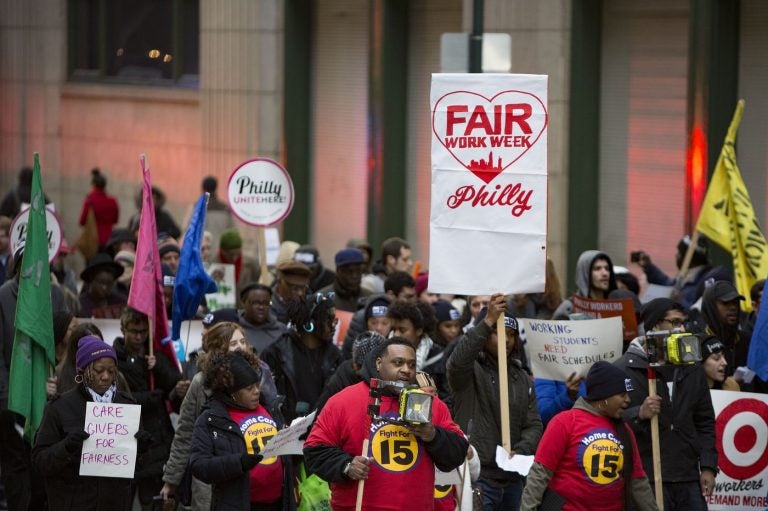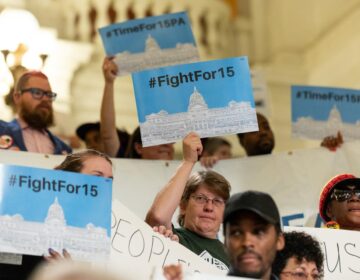Philly Council approves bills for ‘Fair Workweek’ and $15/hr wage hike
Thursday is a big day for the labor community in Philadelphia.

Fast food and retail workers and their supporters marched through Center City to kick off the fight for "Fair Workweek" legislation in February 2018 (James Blocker/Philadelphia Inquirer)
Updated: 3:50 p.m. EST
Nearly a year after advocates and workers launched a campaign to fight for more predictable scheduling for those in the service industry, City Council has voted the “Fair Workweek” bill into law. It will regulate how retail, fast-food, and hospitality companies assign their workers to shifts. Without predictable schedules, workers say they can’t budget or plan for their lives, which keeps them in a cycle of poverty.
The vote was 14-3, with Councilmembers David Oh, Al Taubenberger, Brian O’Neill voting no. O’Neill said he opposed the bill because it covered unionized workers, whom he said did not need the protections outlined in the bill.
This makes Philadelphia the second-biggest city in the country, after New York, to pass a scheduling law. The legislation, introduced and championed by Councilwoman Helen Gym with seven co-sponsors in June, will ultimately need to be signed by Mayor Kenney. He endorsed the law at a news conference Monday hosted by the Philadelphia AFL-CIO labor umbrella organization.
It’s expected to affect 130,000 workers, according to Gym’s office, including unionized workers, unless their contract stipulates an exemption, and hotel workers — Philadelphia would be the only city to pass a “Fair Workweek” law that covers the hotel industry. (The State of Oregon’s bill, however, does cover hotel workers.)
Also Thursday, Council voted unanimously to raise the minimum wage for city workers and those employed by city contractors and subcontractors to $15. That bill was introduced by Councilperson Mark Squilla on behalf of Kenney, and it builds on a 2014 action that raised the minimum to $12 an hour. The city is not sure how many contracted and subcontracted workers the law would affect but said it would likely include those employed by social-service agencies, like after-school aides and custodians.
“This is a time period when people feel like there’s such little movement for issues for working Americans,” Gym said in an interview Wednesday. “We in our city are choosing to do something about it, and I think it matters that we’re doing it in the poorest big city in America.”
A controversial bill
The fight for the Fair Workweek bill, the latest in a national trend of cities and states passing similar laws, has been more contentious than that of the minimum wage hike. (No opponents to the wage bill testified at a City Council hearing in late November.) Supporters of the bill, from the Democratic Socialists of America to the interfaith group POWER to labor unions, packed City Council during an October hearing and again the following month. Advocates hosted numerous rallies and marches throughout the year to keep attention on the issue.
The Greater Philadelphia Chamber of Commerce opposed the bill, saying that it will hurt business growth in a city that badly needs it. Other opponents included the Philadelphia Convention & Visitors Bureau, which said it would hurt the tourism industry in the city, chains like Wendy’s and Target, which vastly expanded their footprints in Philadelphia in the past year, and the Greater Philadelphia Hotel Association.
Gym sold the bill as “anti-poverty” legislation, said Ed Grose, executive director of the Greater Philadelphia Hotel Association, but he noted that the average hotel worker is not living in poverty. According to a survey conducted by the association, hotel workers make $44,000 on average.
Some hotel workers, like those with the Philadelphia Marriott Downtown, say that their unpredictable schedules can result in lower take-home pay, even if their hourly rates have been increased.
Grose said some council members had planned to introduce amendments on the hotel association’s behalf but ultimately did not.
A coalition of traditional labor and “alt-labor”
The coalition that backed the legislation is notable for how it united traditional labor unions and groups backing non-union workers and speaks to a change in the labor movement. A traditional labor mindset might not support broad worker protections because it could hurt the case for unionization. Kenney, backed by unions, ran on a labor platform, but when Kenney was a councilman, he voted twice against the paid sick-leave bill.
Times have changed. Richie Lazer, Kenney’s chief labor official who has ties to the Philadelphia Building Trades, was an outspoken supporter of the bill, as was the Philadelphia AFL-CIO. AFL-CIO member unions like UNITE HERE, the United Food and Commercial Workers, and the Communication Workers of America, are covered by the bill.
That unionized workers are covered by the bill was a point of contention, several people familiar with the matter said. Philadelphia’s paid sick leave bill, passed in 2014, carved out unionized workers, which set a precedent that labor advocates had to negotiate to overcome. Unions like UNITE HERE wanted unionized workers to be covered by the law because the Fair Workweek bill would afford greater protections than what it is included in most contracts, said UNITE HERE analyst Dermot Delude-Dix.
It helped that in a letter sent last month, Pat Eiding, president of the Philadelphia AFL-CIO, asked council to keep unionized workers covered by the bill. The AFL-CIO acts a spokesperson of sorts for many labor unions in Philadelphia.
It also helped that covering union workers has become the norm in scheduling bills, and other workplace bills, that have recently been passed across the country.
How Philly’s bill compares to laws across the county
Philadelphia’s Fair Workweek bill is stronger in some ways than those across the country, but weaker in others, said Rachel Deutsch, an attorney with the Center for Popular Democracy, a main organizer of the national Fair Workweek movement.
According to Deutsch, the bill’s strengths include that it:
- asks for employers to pay “predictability pay” to workers for changes in not only time of shift, but location;
- requires employers to provide more detail in their estimate of how many hours a job will entail and states that an offer made in bad faith is a violation;
- requires the employer to make the new fair workweek rules clear so that employees know their rights.
But it’s weaker in that the bill:
- does not require employers to pay predictability pay for shift changes for ticketed events and banquets;
- requires nine hours of rest between shifts, while other laws require 10 or 11;
- Allows employers to change schedules within the first 24 hours after posting without having to pay predictability pay.
Philadelphia Media Network is one of 21 news organizations producing Broke in Philly, a collaborative reporting project on solutions to poverty and the city’s push toward economic justice. See all of our reporting at brokeinphilly.org.

WHYY is your source for fact-based, in-depth journalism and information. As a nonprofit organization, we rely on financial support from readers like you. Please give today.




